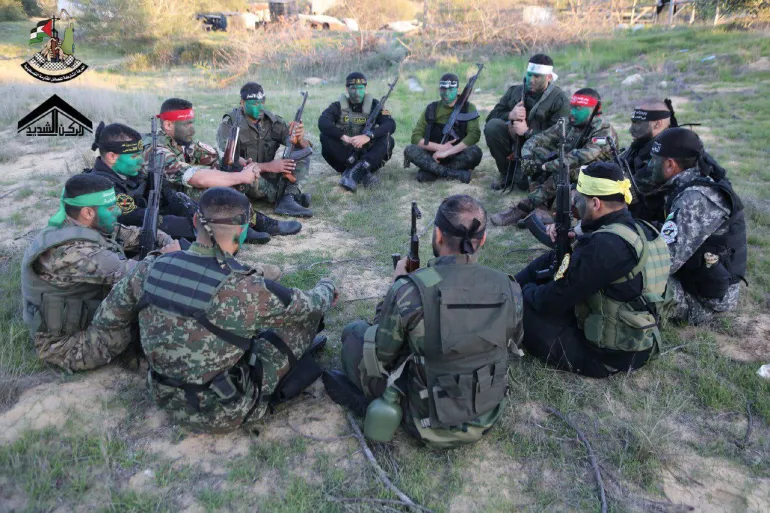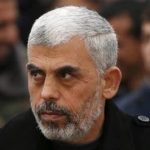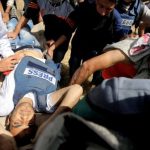
22/11/2023|Last Update: 23/11/202306:44 PM (Makkah time)
Israel did not expect that Yahya Sinwar, the man who collected sentences of more than 430 years in prison and unreservedly released him in the Gilad Shalit deal (Wafa al-Ahrar deal) in 2011, would inflict years later its biggest military loss in its history and impose new equations for the conflict, which he planned and planned.
With a lot of exaggeration mixed with anger, Israeli Prime Minister Benjamin Netanyahu later describes Sinwar as a “dead man walking” as the first wanted for liquidation, Netanyahu sees him as his first enemy, and the Israelis believe that he is the most deceived by what they imagined as a tendency to calm down, as they consider him the mastermind of what they called “the dreaded Black Saturday” on October 7, which extended to constitute a comprehensive Israeli dilemma in Gaza ranging between military, moral and political.
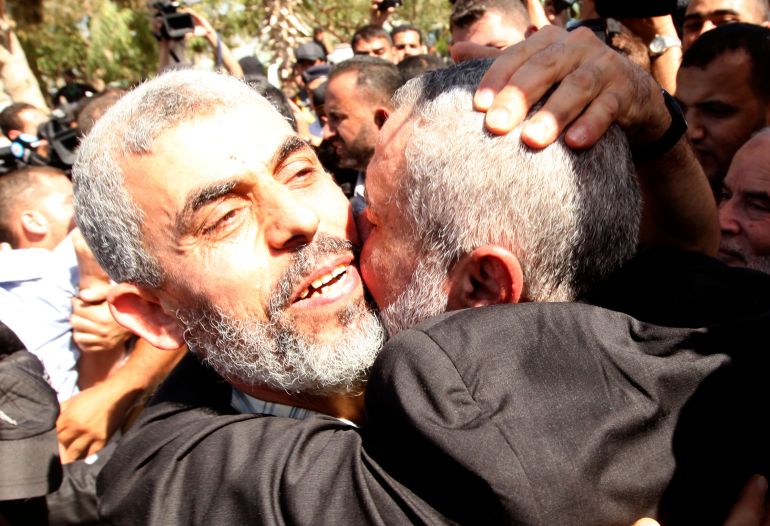
Sinwar was released as part of a prisoner exchange deal between the resistance and Israel in 2011 (Reuters)
Israel’s First Goal
With his gray hair, less white mustache and serious features, the image of the head of the Islamic Resistance Movement (Hamas) in the Gaza Strip, Yahya Sinwar, 61, can easily be seen on a poster in the form of an assassination list that also includes photos of resistance leaders at the headquarters of the Israeli Defense Ministry.
Sinwar, nicknamed “Abu Ibrahim,” remained 23 years in Israeli prisons, and Israel claimed to have experience with his personality and how to deal with him, but military and intelligence officials confirmed to the British newspaper Financial Times that “the wrong assessment of his personality was a prelude to the biggest failure in the field of Israeli intelligence.” Michael Milstein, a former officer in Israeli military intelligence, told the newspaper: “As for Sinwar, we didn’t understand him at all. He succeeded in the final deception.”
The Israeli predicament with regard to Sinwar’s personality deepens in the issue of the ongoing negotiations over the prisoners, as Haaretz confirms that he personally handles any contacts on the subject, and that he adheres to his hardline position in the complex course of negotiations, as the American Axios website pointed out that Sinwar had stopped the negotiations after the Israeli army bombed the Shifa Hospital in Gaza.
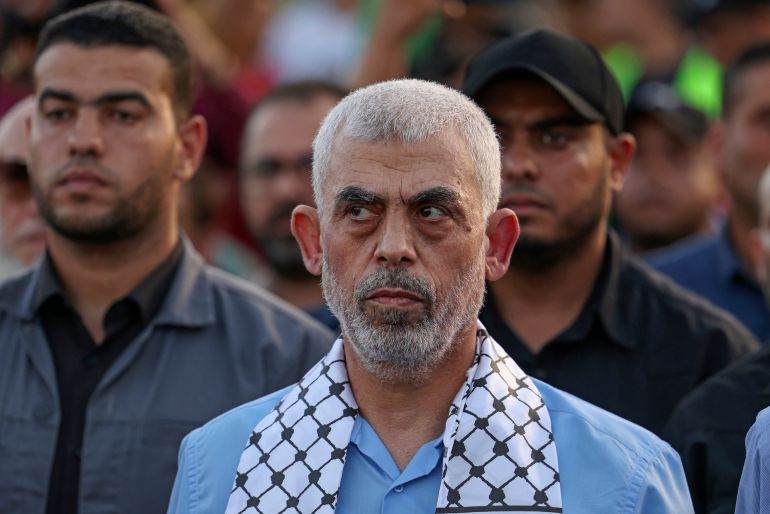
A man from Gaza
On October 29, 1962, a Palestinian child was born in Khan Younis refugee camp south of Gaza, bearing the name Yahya Ibrahim Hassan Sinwar to a refugee family from the city of al-Majdal near the city of Ashkelon.
Sinwar grew up in the camp, prematurely, like any Palestinian, to the impact of the act of resistance, the songs of the revolution, the funerals of the martyrs, promises of revenge for them, and their pictures hanging on the walls of cities and camps, so the Palestinian tragedy was instilled in his mind and heart, and the road to the liberation of Palestine became clear to him and “passes through the barrel of a gun.”
At the Islamic University of Gaza, he obtained a bachelor’s degree in Arabic, and Sinwar headed the leadership of the “Islamic Bloc”, and was arrested by the Israeli army in 1982 for the first time, and released after days, to be arrested again in the same year, and sentenced to 6 months in prison on charges of participating in security activities against Israel, and Sinwar came out of prison to establish a security apparatus known as “Al-Majd” in 1985, and its mission was to pursue collaborators with the occupation.
On December 8, 1987, the first spark of the intifada was sparked from Jabalia in Gaza, following the martyrdom of four workers at the Beit Hanoun (Erez) checkpoint, and the stone intifada rolled to include the West Bank, Gaza, occupied Jerusalem, and the 1948 territories.
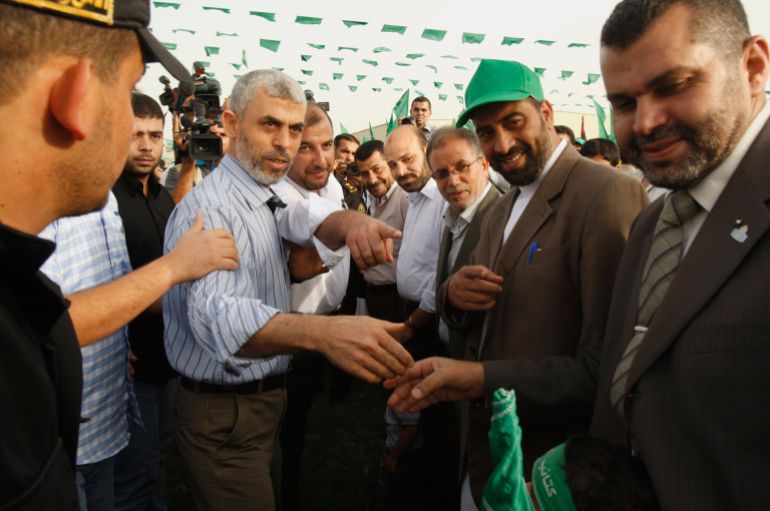
In the midst of this intifada (1987-1994), the Islamic Resistance distributed its first founding statement on December 15, 1987, in which Sheikh Ahmed Yassin began to form an Islamic organization to fight the Israeli occupation in order to liberate Palestine, called the Islamic Resistance Movement (Hamas).
For Sinwar, stones, slingshots, matita, civil disobedience, and demonstrations used by Palestinians against the Israeli occupation army seemed important to advance the Palestinian struggle, but they fell short in the face of Israeli brute force, so he planned to establish a military apparatus, later known as the Palestinian Mujahideen, and Israel arrested him on January 20, 1988, and sentenced him to life imprisonment four times, in addition to 30 years.
The intifada did not subside with the wave of mass arrests carried out by Israel, and escalated, and the killings of Israeli soldiers and the assassination of agents increased, so on May 18, 1989, the Israeli occupation authorities arrested the leader and head of Hamas, Sheikh Ahmed Yassin.
With Sheikh Ahmed Yassin
The relationship in prison between Sinwar and Sheikh Yassin was strengthened, so he became one of his close advisers, and he also volunteered to help him with food and move him from one room to another, and Sheikh Yassin saw Sinwar as a leading person, as reported by the Israeli channel “Kan”.
Many testimonies of people who have known Sinwar for a long time inside or outside prison indicate that he is an organized, ambitious and sharp-witted man, while Officer Micha Kobe, who oversaw his interrogation for the Shin Bet in 1989, described him as “a man with a commanding presence, charisma, few words, and irritable” and described by the Israeli website NRG as “a leader inside and outside prison, and a man of discipline.”
Israeli reports confirm that Sinwar mastered the Hebrew language, which enabled him to follow and analyze what is happening inside Israel, and the Israeli newspapers describe him as “not just an ordinary leader who grew up inside the Gaza Strip,” where he was able to monitor Israeli society in depth, and used to read newspapers in addition to the biographies of Israeli leaders.
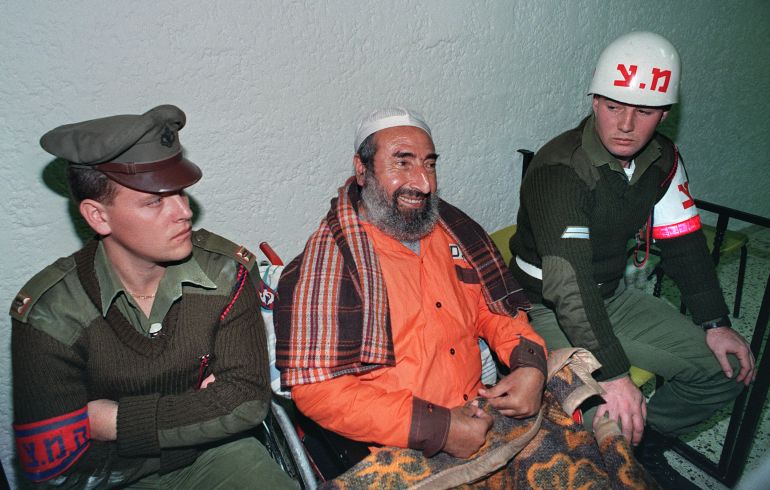
The Financial Times reports that Sinwar, after learning Hebrew, read the Israeli mind well, and read the books and ideas of the leaders of the Zionist movement such as Ze’ev Jabotinsky, Menachem Begin and Yitzhak Rabin.
In his prison, Sinwar continued guerrilla operations against the Israeli army in the West Bank, Gaza and inside the Green Line, and those seven years of the first intifada are among the most important stages in the history of the Palestinian struggle, resulting in the martyrdom of more than 1,500 Palestinians, the arrest of between 100,000 and 200,000, and the injury of more than 70,000, according to the Palestinian news agency Wafa.
From behind bars, Sinwar watched the outbreak of the Second Intifada on 28 September 2000, which inflamed the Palestinian territories with a series of bloody confrontations, which spread to all Palestinian cities and towns, in protest against the provocative visit of then-right-wing opposition leader Ariel Sharon to the courtyard of the Al-Aqsa Mosque.
In 1997, Sheikh Yassin came out of prison, the disabled man was not hidden, he was traveling openly with help to the mosque, so Israel assassinated him at dawn on March 22, 2004 by firing three rockets while he was out in his wheelchair from the Sabra neighborhood mosque in northern Gaza City, and later assassinated a number of the movement’s leaders, and new generations and leaders emerged, including Yahya Sinwar.
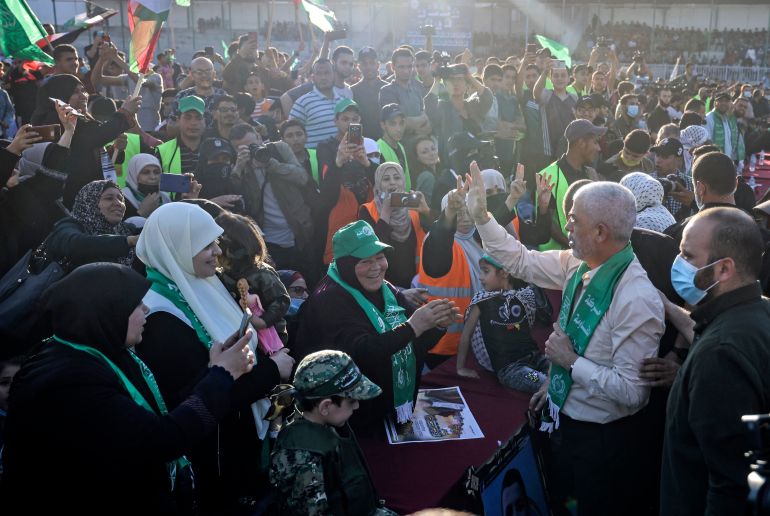
From behind bars
The Israeli newspaper Yedioth Ahronoth reports that Sinwar was a figure unknown to Israelis, but what he was known for inside prison was “a man from a fighting family, strict, and away from appearing in the media.”
In Beersheba prison, Sinwar was not enthusiastic about an interview on Israel’s Channel Two, but eventually agreed to give the interview, which apparently took place in 2006, when Hamas won the Palestinian legislative elections.
The Israeli journalist begins his report with a sentence: We came here to meet one of the most important prisoners, the chief Hamas prisoner and one of the founders of the Qassam Brigades. At the time, the video report shows Hamas’s Shura Council in prison, describing it as the strongest among Hamas councils in the West Bank, Gaza, Syria and Jordan.
The journalist asks Sinwar a question about a long truce with Israel, and he replied in Hebrew, which he mastered: We know that Tel Aviv has 200 nuclear warheads, and is superior in the air force, we cannot destroy it, so we support a long or short truce, and we will prove to the world that we respect it (the truce), Sinwar stressed that he will not recognize the State of Israel even though he supports the truce option, and called on the Israelis to support it.
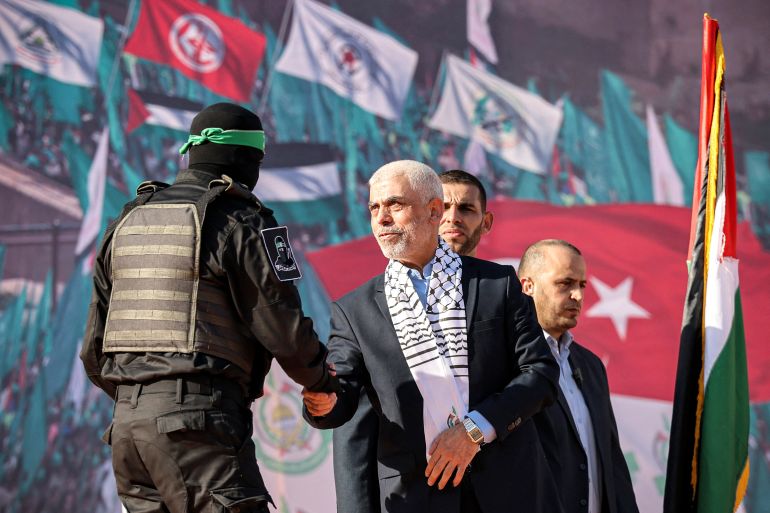
Recently, Sinwar spoke to an Italian journalist, revealing his thoughts and aspirations for impoverished Gaza. He told him he “doesn’t want war” and that he wants a “ceasefire.” His ambitions were to transform the sector into a place resembling “Singapore or Dubai,” according to Bloomberg.
An Israeli intelligence assessment summarizes Sinwar’s personality during his time in prison, according to the Financial Times, as “authoritative, influential, acceptable to his friends, with extraordinary stamina, cunning and manipulation, content with little, keeping secrets even inside prison among other prisoners, and having the ability to persuade and mobilize.”
From prison to driving
Sinwar spent many years in Israeli prisons, becoming a commander who participated, from behind bars, in arranging the names of prisoners to be released in the deal for Israeli soldier Shalit on October 11, 2011.
Sinwar was part of the prisoner exchange deal, and after his release from prison, he participated in the internal elections of Hamas in 2012, won membership in the movement’s political bureau, and was responsible for overseeing the military apparatus “Al-Qassam Brigades.”
In February 2017, the results of Hamas’s internal elections in Gaza resulted in Sinwar winning the movement’s presidency in the Strip, succeeding Ismail Haniyeh, who held the post.
In November 2019, Sinwar spoke during his meeting with university youth about the state of chaos in the Arab and Islamic world, and about the fabrication of conflict and sectarian rupture in the region, in order to “distract the nation from the Palestinian cause,” and he also criticized the Arab countries and America, whose former President Donald Trump said Jerusalem was the capital of the Jews, “without anyone objecting,” warning of the “deal of the century,” which means “writing off the Palestinian cause.”
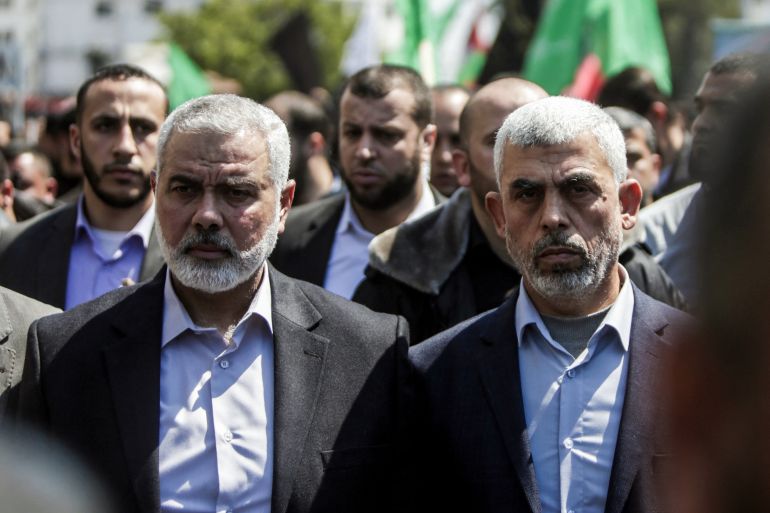
Israel recognizes that Sinwar is very popular on the Palestinian street before and after the launch of the Al-Aqsa flood, as he addressed the Palestinian street, in all its colors and factions, urging the generation to confront the injustice to which Palestinians are subjected, and praising the shootings targeting Israeli soldiers in the West Bank.
In a speech in 2022, Sinwar was warning the occupation against “harming Al-Aqsa Mosque”, so he appealed to the Al-AqsaMartyrs Brigades in the West Bank, saying, “There was no revolution without you being its backbone”, and stressed that the first burst of rockets that will be launched in defense of Al-Aqsa will be 1111 rockets, explaining that the number of these rockets means the anniversary of “the martyrdom of the immortal commander Abu Ammar”.
Over the past few years, Sinwar has been clearer than ever about the resistance, talking about the military power it possesses, thanking its allies, supporters and public, and threatening the occupier and drawing red lines for him.
At the same time, Abu Ibrahim was talking about projects inside Gaza, and his vision to get out of what he called “the impasse surrounding the national project,” and the call for the formation of a Palestinian unity government, stressing that Hamas is striving to prevent a new war on the Gaza Strip, and said, “We do not want war, and our people want to catch their breath,” but stressed that “at the same time they are not afraid of it.”
Sinwar worked through intermediaries to convince Israel that his intentions were good, and he cooperated with the Palestinian Authority to issue work permits to 18,000 Palestinians, allowing them to work in Israel.
Israeli officials claim that some of these workers helped prepare for the October 7 attack by “mapping Israel and preparing lists of local family names.”

Resistance and deterrence
Although he is rarely visible, he is keen every time to talk about the military force in the Gaza Strip, saying, “We have a significant military force in the Strip, and the enemy calculates a thousand accounts, and we have hundreds of kilometers of tunnels, and we have hundreds of control and control rooms above and below ground, and we have hundreds and thousands of ambushes, and we have thousands of anti-armor that were made in Gaza, and we can turn the occupation cities into ghost towns.”
Following the battle of the Sword of Jerusalem in May 2021, former Israeli Defense Minister Benny Gantz threatened to assassinate him, so Sinwar came out challenging Gantz to go home on foot, saying, “I am ready, and I will not blink.” Addressing him with a message in another speech, Sinwar said: “We are waiting for you and we will make you, Gantz, curse the day you were born.”
Sinwar talked a lot about the unity of Palestinian blood, and contributed to the establishment of a joint room for factions, and in December 2020, the chamber announced the implementation of the first joint military exercise called “the severe corner”, stressing the continuation of the resistance and raising its readiness and the efficiency of its fighters.
The slogan “The morning is near” was the most prominent in that maneuver announced by the Palestinian resistance, and about 25 days before the attack on Israel, the joint room of the resistance factions held its last military exercises in Gaza.
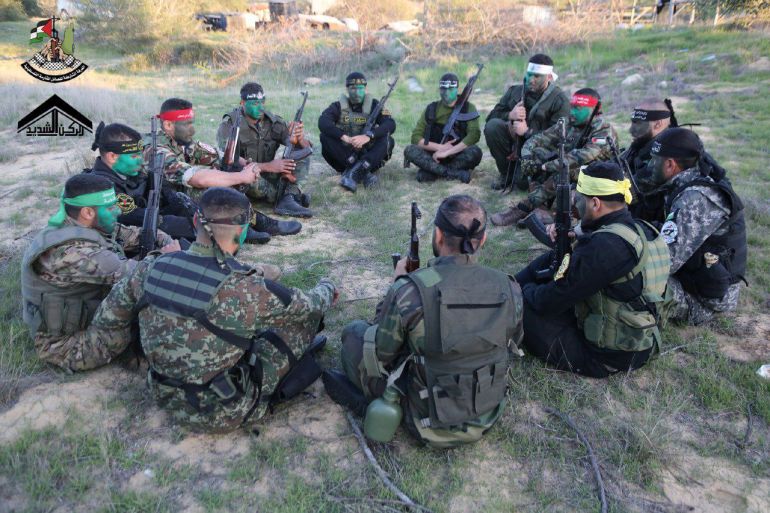
Israeli analysts say Sinwar was sending signals aimed at calming, but he was trying to buy time: what happened on October 7, military intelligence in Tel Aviv indicates that it took at least a year of planning.
Prior to the “Al-Aqsa flood,” Israel viewed Sinwar as a “dangerous extremist,” but he was reportedly accepted, seeing him more interested in consolidating Hamas rule in Gaza and extracting economic concessions from the war.
Sinwar’s personality, by reading the Israeli mind since the days of imprisonment and Israel’s interpretation of his personality, statements and actions, was part of the strategic deception plan that led to the success of the “Al-Aqsa Flood” with or without it.
Since October 7, Israel has launched an unprecedented attack on Gaza that has exceeded in its brutality all international and humanitarian laws, in which it has not achieved its military goals set so far, and strengthened its strategic defeat, and Sinwar remains a major target for this campaign as well as other resistance leaders, “but Israel was humiliated and this alone may be a sufficient victory for Sinwar,” in reference to the “Black Saturday” attack, says Shin Bet officer Micha Kobi, who knew Sinwar and interrogated him as a prisoner 34 years ago.
